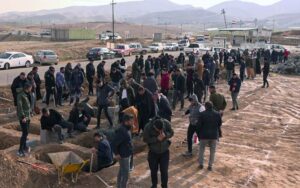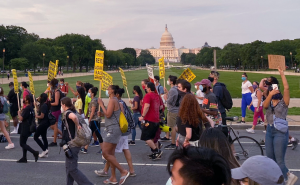PORT-AU-PRINCE, Haiti (AP) — Dressed in black and white, the crowd of angry teenagers squeezed into a narrow street in Haiti’s capital.
They stopped in front of a cemetery and hoisted a coffin onto their shoulders, tears rolling down some faces.
“Viv Ansanm manje li!” they chanted loudly in Haitian Creole as they walked to and fro, the coffin swaying gently with their 16-year-old friend inside.
Their chant accused a gang coalition called Live Together of killing Jhon-Roselet Joseph. He was struck by a stray bullet earlier this month in his community of Solino, which gunmen have repeatedly attacked.
Finding closure for loved ones killed by gangs on a relentless rampage through Haiti’s capital and beyond is growing harder day by day in a country where burial rituals are sacred and the dead venerated.
More than 2,500 people were killed or injured in just the first three months of the year, according to the United Nations.
Victims of gang violence are increasingly left to decay on the street, prey to pigs and dogs, because a growing number of areas are too dangerous for people to go out and retrieve the bodies. Some bodies are never seen again, especially those of officers with Haiti’s National Police who are killed by gangs.
READ MORE
Still, there are those like Joseph’s friends and family who brave the streets despite the danger of whizzing bullets so they can give their loved ones a proper burial.
Death and life are tightly intertwined in Haiti, where many believe that bodies need a formal resting place so their spirits can drift into the afterlife.
On a sweltering morning, a handful of musicians played drums and a trumpet Saturday as Joseph’s friends and family pushed into a small and crowded cemetery, hoisting the coffin up high as small bottles of Barbancourt rum were passed around.
The cries grew louder when his friends opened the coffin, bidding farewell as they vowed revenge.
“Solino will never die! We will always stand up and fight,” said Janvier Johnson, 28.
“The fight is just beginning!” another man yelled as he wiped his brow.
Joseph was killed last Sunday, around 5 p.m. He had gotten a haircut at the barbershop in anticipation of going back to school and was crossing the street to go home when a bullet struck him in the neck, said Frantz Paulson, his 24-year-old cousin.
Paulson is familiar with the difficulty of burying people amid incessant gang violence. His older brother was killed by a stray bullet last month and his mother killed last year. They all lived in Solino, one of the last strongholds in Port-au-Prince that has yet to be taken over by gangs that now control 80% of the capital.
Considered a strategic location, gangs have been chipping away at territory in Solino, opening fire from roofs. Bullets killed three other people the same week that Joseph died.
As a result, community leaders have sealed off Solino, controlling who enters the working-class neighborhood that is home to dozens of police officers.
Although many in Solino refuse to speak to reporters, the community welcomed a team of Associated Press journalists the day Joseph was buried.
His mother, Daphne St. Cyr, recalled how Joseph loved school and wanted to become an agronomist. He also was a huge soccer fan and played often, she said.
“Ever since he was a baby, anything he could find, he was kicking it,” she recalled with a serious face.
He was obedient and got along well with many people in the neighborhood, St. Cyr added.
“Everybody loved him, all the kids, all the grownups,” she said. “He respected everyone.”
Joseph’s older sister stood quietly next to her mother, declining to say anything.
“I don’t want to lose her,” St. Cyr said, looking at her daughter. “I want her to leave the country.”
The gang coalition created by a former elite police officer named Jimmy Chérizier, best known as Barbecue, is blamed for the killings and attacks in Solino.
A neighborhood of roughly 80,000 people, it already has nine large makeshift shelters crowded with families who have fled violence, said Daniel Saintiace, a community leader who vowed that Solino would not be taken by gangs.
“We resist. That’s how we stay strong,” he said as he called on people to help Solino. “We are not going to run.”
Joseph was buried a week after he was killed, his family relieved they found a place for him since gangs have blocked access to many areas in the capital, even revered spaces.
“Not all cemeteries are available,” said Nicy Nadir, a musician who plays at funerals. “There are places you can’t go.”
Pastor Claudy Midy, who owns the funeral home that helped organize Joseph’s burial, said the only solace he can provide is to sit families down and explain to them that death is part of life.
He added that burials are very important in Haiti, especially when someone young dies.
Midy was comforted that Joseph’s family was able to bury him. When people call the funeral home but say they have no body to bury, all he can offer them is a poster with the person’s picture and a brief symbolic ceremony.
https://apnews.com/article/haiti-death-gangs-killed-funeral-solino-3f616868b7bef8f7f40f036198e332a3




